Behind the walls of most every home, a powerful energy force snakes through ceilings and down floorboards, traveling close to the speed of light.
It zips through wires to outlets and into cords that power cellphones and televisions, air conditioners and furnaces.
Out of sight, electricity is hardly noticed — unless it jumps off course, escaping through a frayed wire, loose connection or overheated outlet. When that happens, it can spit sparks and heat to temperatures hotter than the surface of the sun, vaporizing most anything in its path.
In theory, its destruction does not discriminate.
In Milwaukee, it does.
As a nonprofit journalism organization, we depend on your support to fund critical stories in local U.S. newsrooms. Donate any amount today to become a Pulitzer Center Champion and receive exclusive benefits!

Patricia Colston didn’t have much choice of neighborhoods in Milwaukee. Blind in one eye with severe arthritis making it difficult to work, the 53-year-old had trouble paying rent in the past. With multiple evictions on her record, relatives said, she was desperate.
She rented the upper floor of a 1920s bungalow on the city’s north side in October 2019. Records show the property on North 14th Street had a history of electrical code violations.

A couple of days after she moved, Colston’s friend, 60-year-old Clarence Murrell, was helping her settle in. The pair were likely sleeping as calamity unfolded behind the walls. It was before dawn on a cold Saturday.
By the time the downstairs neighbor smelled it and called 911, it was too late. Thick, sooty smoke had filled the apartment. Firefighters found Colston and Murrell unconscious and were unable to resuscitate them.
Police and fire reports were clear: Fire was smoldering among the electrical wires in the space behind the walls. They suspected that’s where it started. Electrical testing was needed to confirm, they wrote.
But that didn’t happen. Instead, the fire was treated as a tragic accident.
Six blocks away, in the previous year, investigators found that faulty wires ignited a fire that ripped through another rental unit. The tenants had repeatedly complained to the landlord about sparking outlets, according to police reports.
And just this past April, fire devoured the top floor of another nearby duplex with a litany of unfixed electrical violations — so many that the city had issued a warrant for the landlord’s arrest.
Those fires, too, were considered mere accidents, despite the complaints, violations and what electricians say: Most electrical fires are predictable and preventable.
These cases are not anomalies. They represent a little-known and life-threatening disparity in Milwaukee, an investigation by the Milwaukee Journal Sentinel has found.
Fires suspected to be started by faulty electrical wiring scorch homes in Milwaukee’s poorest ZIP code at five times the rate of the rest of the city.
The already distressed 53206 ZIP code — and areas surrounding it — are the epicenter for electrical fire danger in the city.
Police and fire investigators, as well as federal, state and local officials, do little to stop it, the Journal Sentinel found.
The people affected the most: low-income Black renters.
Authorities, by their own admission, routinely do not thoroughly investigate electrical fires, marking their causes as “undetermined” and, in the process, denying families closure and legal recourse and leaving policymakers in the dark about the problem and how to address it.
Will Sherard, the owner of the house where Colston and Murrell were killed, denied any knowledge of what caused the fire.
“There was no electrical fire over there,” Sherard told a Journal Sentinel reporter. “I do not know what happened over there.”
Sherard said he had never seen the police or fire reports that both stated faulty electrical wiring likely started the fire. The Journal Sentinel left a copy of the reports for him at his office. He has declined to answer additional questions.
The Journal Sentinel's findings expose another systemic assault on the already beleaguered 53206 neighborhood, which has long suffered from neglect and discrimination by governments and corporations. The home where Colston and Murrell perished sits in the heart of a community that, aside from small pockets of stability, faces the city's most severe poverty, crime, unemployment and evictions rates — essentially trapping many families in substandard housing.
Nearly 95% of the population in 53206 is Black, and more than half are renters. Electrical fires disproportionately ravage rental properties: A Journal Sentinel analysis of fires from 2009-19 showed that while an average of 30% of the city’s homes were renter-occupied, 62% of suspected electrical fires occurred in rental units. And nearly two-thirds of the fires took place in ZIP codes that are predominantly Black.
Electrical fires often start in concealed spaces, making them stealthy and more deadly than other kinds, such as cooking fires.
While electrical fires account for an estimated 10% of all residential fires, they cause 18% of the fatalities, according to the National Fire Protection Association, an international nonprofit organization that conducts research on fires.
The association estimates that every year 300 to 500 people nationwide die, and more than 1,200 are injured, in residential electrical fires.
But the association’s figures are significantly undercounted because they are dependent upon shoddy data and incomplete reporting from government entities, cloaking the full scope of the problem, the Journal Sentinel’s investigation found.
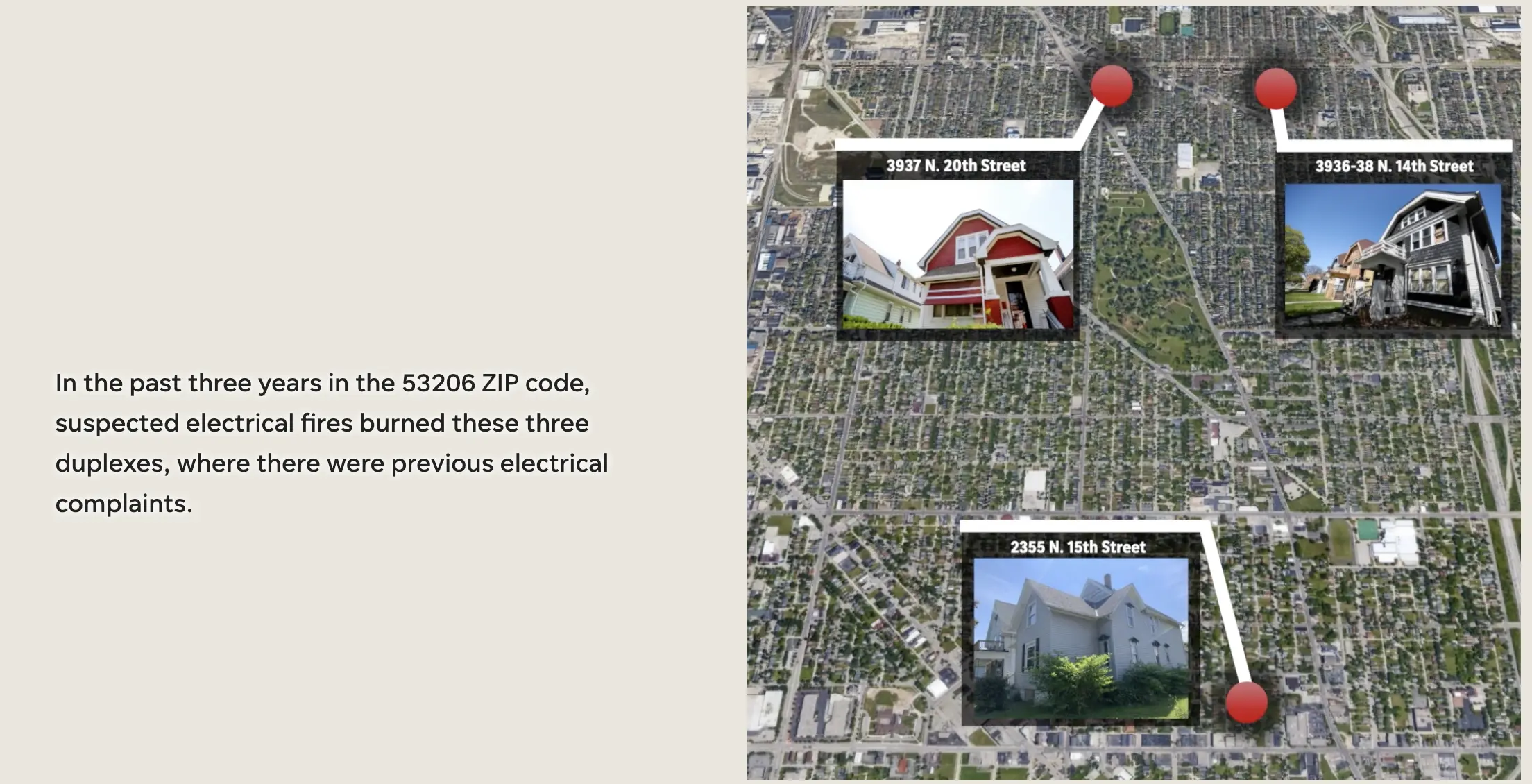
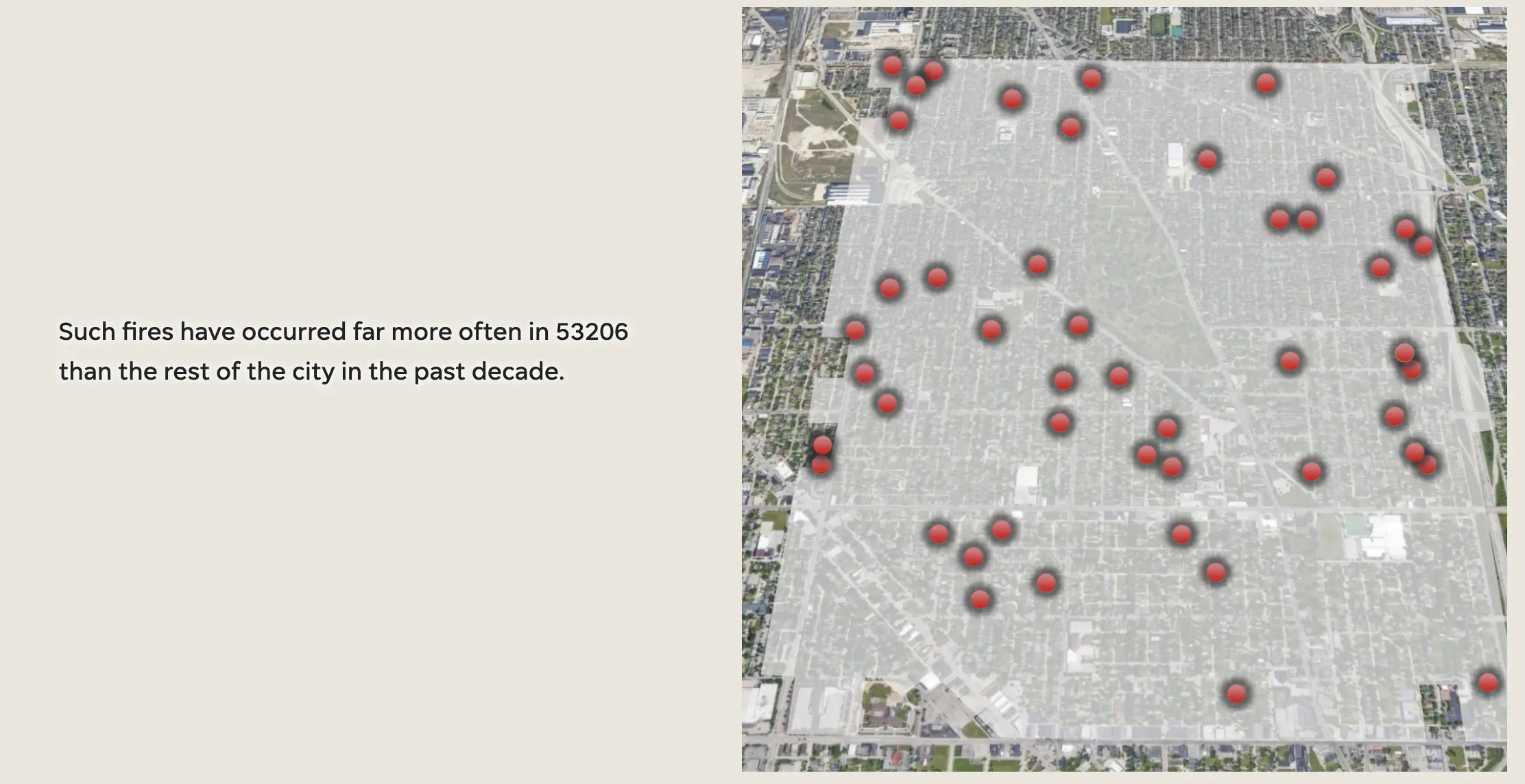
Milwaukee once had several safeguards in place that helped detect dangerous wiring and other problems. But starting in 2011, a group of state lawmakers, some moonlighting as landlords, dismantled the safeguards in a series of sweeping laws promoting the interests of landlords.
Milwaukee’s Department of Neighborhood Services, whose mission includes protecting renters’ safety, has failed to hold unscrupulous landlords accountable as violations mount, allowing them to continue renting unsafe units.
Mayor Tom Barrett declined interview requests, referring questions to Erica Roberts, the city's commissioner of building inspections.
When told of the Journal Sentinel's findings, Roberts said: “This is interesting data, and it’s sad data.”
Roberts said the city does what it can to protect renters. “We do everything in our power within the ordinances,” she said. “We’re certainly open to suggestions.”
Milwaukee police and fire departments don’t have electrical engineers on staff. If they don’t suspect arson or homicide, they don’t typically investigate electrical fires, they said. The same is true of the state fire marshal.
Heiner Giese, an attorney for the Apartment Association of Southeastern Wisconsin, a landlord trade group that lobbied in favor of the landlord-friendly laws passed by state lawmakers, said he wasn’t aware that Black renters in Milwaukee were being disproportionately affected by suspected electrical fires and that little was being done to prevent the problem.
“No landlord wants to wake up and see on the news they’ve had a fire and one of their tenants has died,” Giese said. “Do we need more inspections and new laws that require better electricity in older buildings? That depends on how many people are killed or injured in a year for whom such inspections would help.”
Colston’s nephew, 29-year-old Earl McDougle of Milwaukee, said he is shocked by how little anyone has cared about the deaths of his aunt and her friend.
“I still feel rage,” he said, “and feel like she still ain’t got justice.”
Warrant doesn’t stop landlord from renting
Ricky Carter frequently had seen lights flicker in the apartment he shared with his girlfriend near North 15th Street and West North Avenue. But on the night of April 26, something was different.
Carter was getting ready for bed. His girlfriend, Leilani Zollicoffer, was asleep; so were her daughters, ages 5 and 2. The lights in the living room and kitchen flickered, rapidly. Carter said he smelled burning and heard a faint beeping from the smoke detector.
When he looked to find the source, he saw an odd sight: smoke coming up from the living room floor. He shook his girlfriend awake, and the couple rushed in to get the girls, whose bedroom was filled with smoke.
The family hustled out and called 911. They watched as firefighters hosed down the house. Their belongings were destroyed.

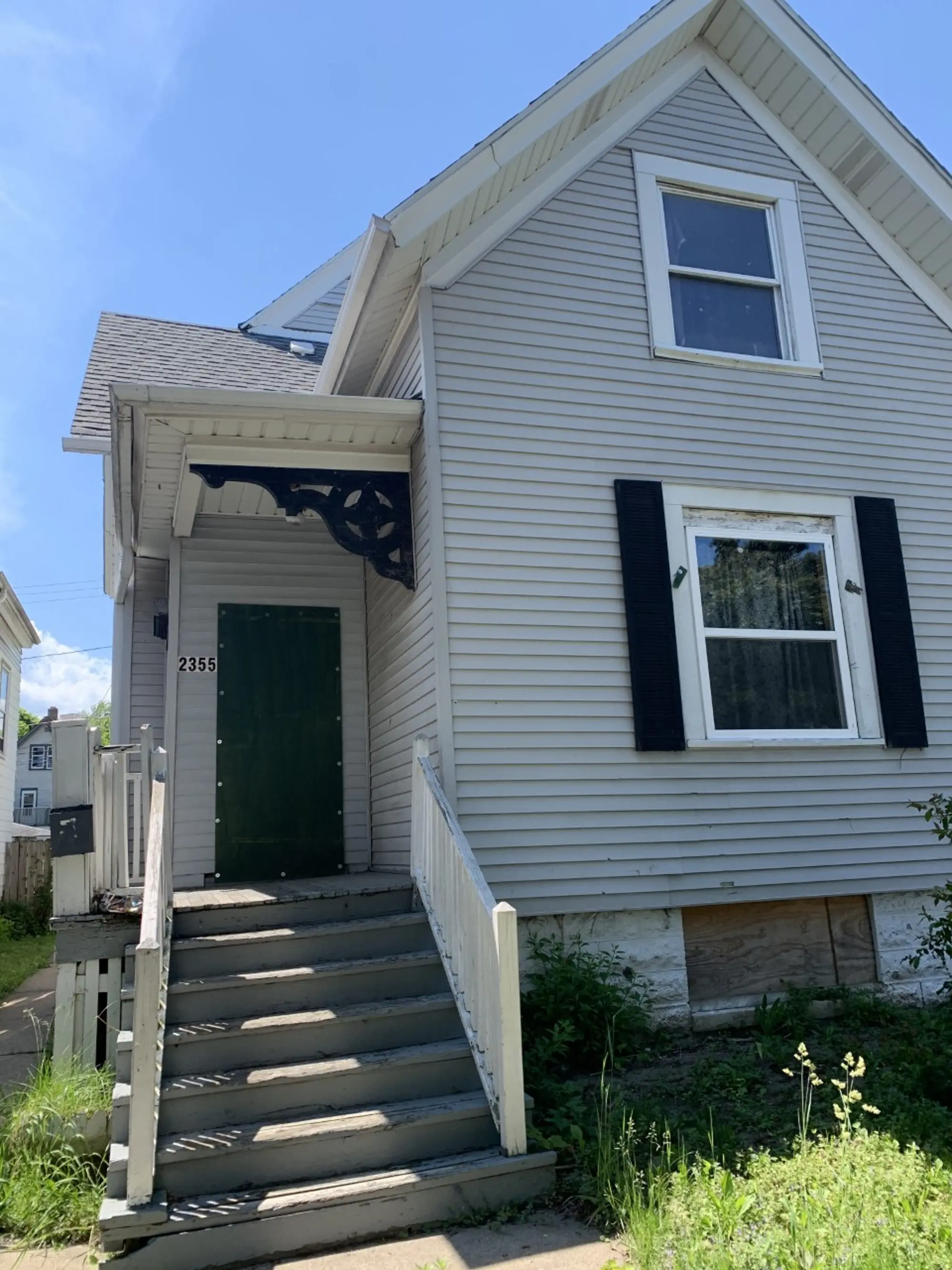
“That fire could have started in the middle of the night when everyone was asleep. Then what?” Zollicoffer, 24, said.
Carter, 30, said he had been worried about the electrical system. “I thought something was going to happen,” he said. “I just didn’t expect it to happen that soon.”
In their report, firefighters wrote, “This fire appears to have been caused by an electrical issue.” But as with the deadly fire that claimed the lives of Colston and Murrell, the reports reveal that little investigation was done into the specific cause of the blaze. Officials labeled it “undetermined.”
Records show the duplex on North 15th Street had a documented history of electrical violations dating to at least 2012, revealing failures by city regulators, courts and others to hold unresponsive landlords accountable.
The property changed hands several times over the last decade, with a man named Tommy Cole purchasing it in 2016. Cole failed to fix electrical problems or pay fines associated with the violations, resulting in a warrant for his arrest, records show. The warrant against Cole remains active, according to records.
Cole and his attorney did not return calls and emails from the Journal Sentinel. Cole, who served time in federal prison on a 2006 drug conviction, pleaded guilty to new federal drug charges in 2019. He is awaiting sentencing, records show.
He sold the duplex to Dominique McKinney and Jerome Ward in April 2019. That same month the city again issued electrical violations on the North 15th Street property.
The city immediately began warning McKinney to fix the faulty electrical system, which, reports show, appeared to be the work of a “handyman,” not a licensed electrician. There were double-tapped breakers in the service box — which can overload the system and cause sparks — and other serious safety violations, according to the report.
Shortly after inspection reports were sent to McKinney, city inspector Matthew Jenrich personally delivered the order to fix the violations to her on May 9, 2019. “I also told her that as long as they are working on correcting the violations, we can work with them,” he wrote in a report.
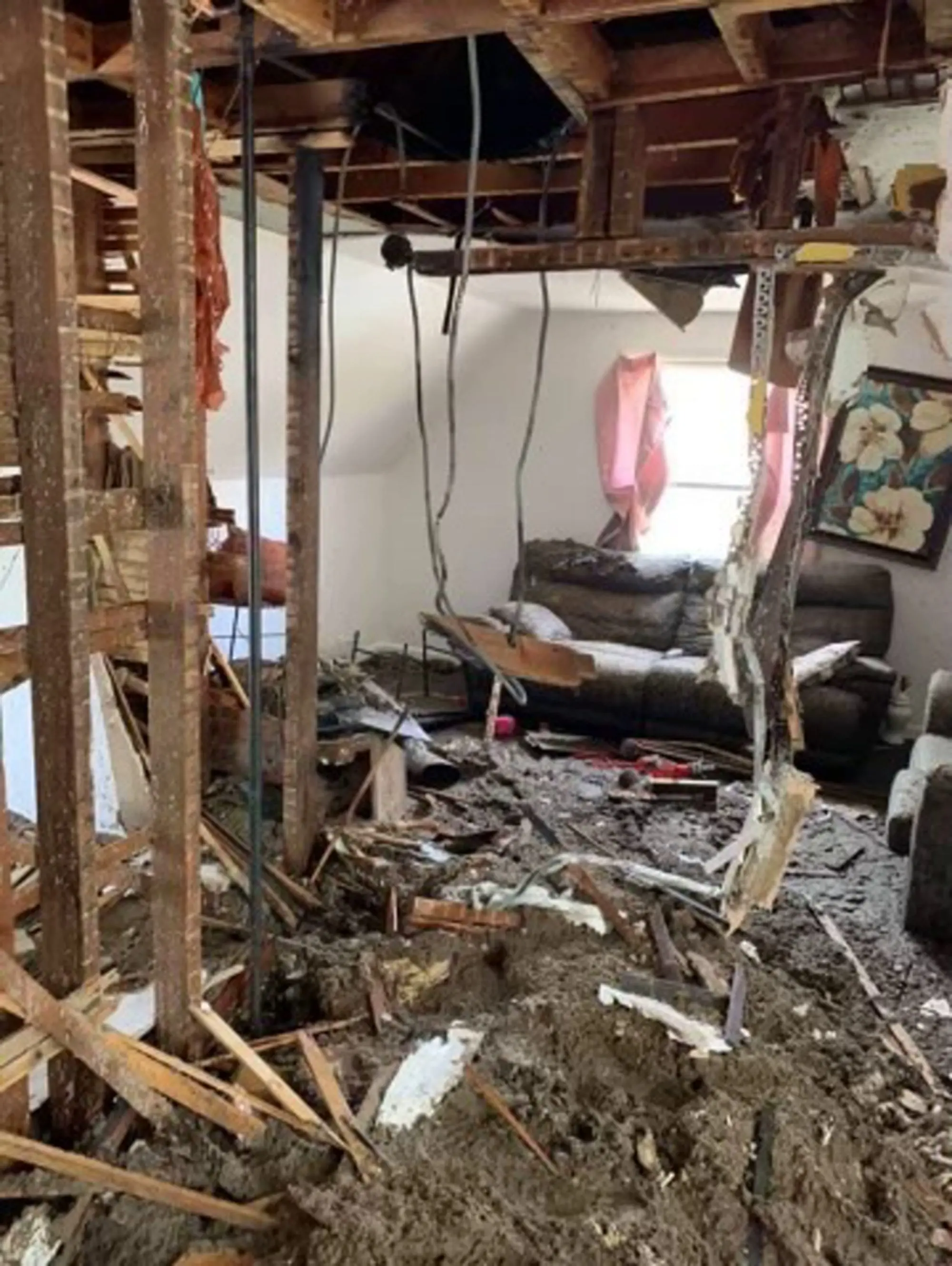
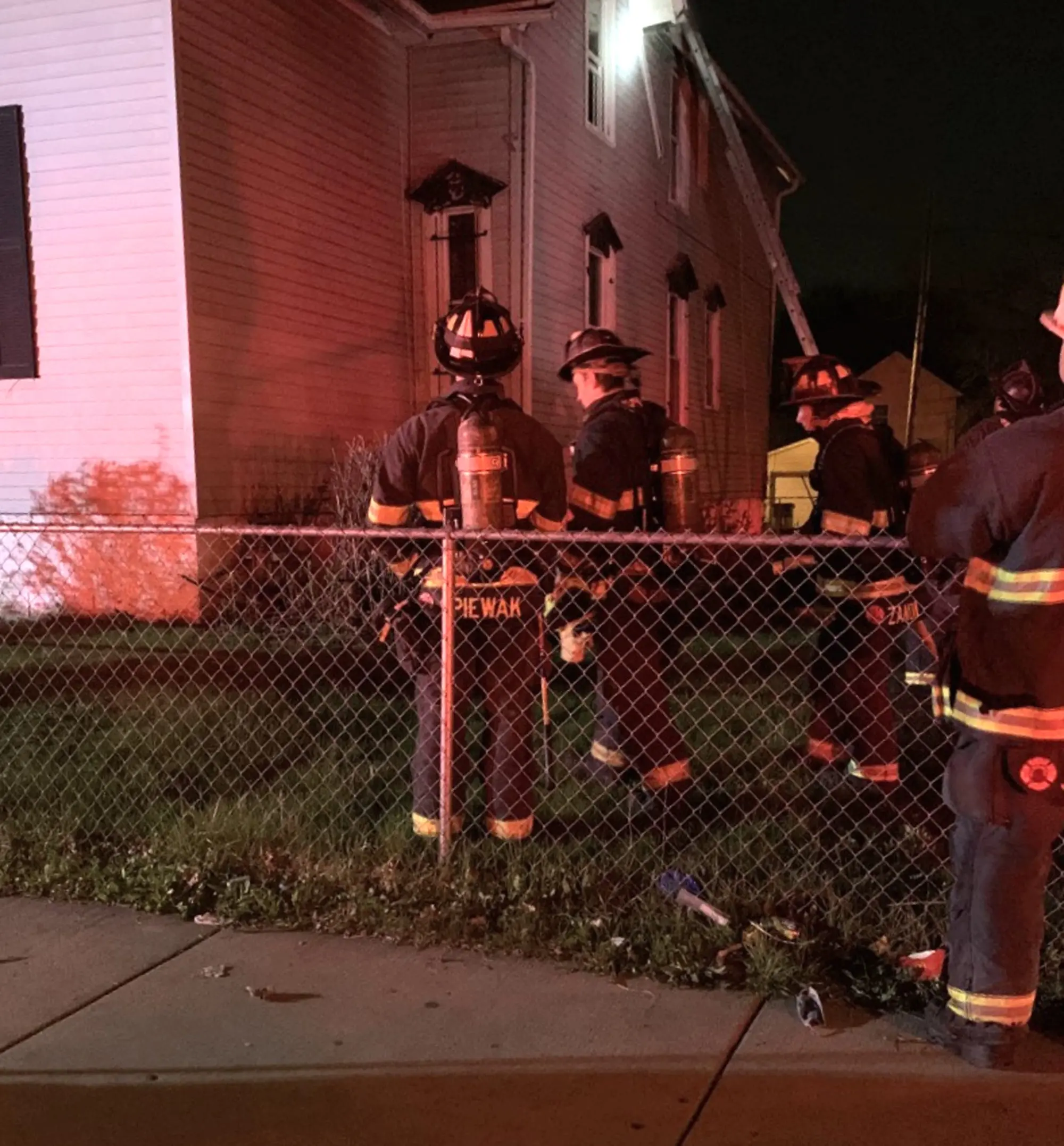
A month later, Jenrich spoke to a renter living in the duplex and was told nothing had been done by McKinney about the electrical violations, according to city records.
The following month, in July 2019, the case and a $980 fine were referred to municipal court. McKinney failed to pay the fine, and, as with the previous owner, a warrant was issued for her arrest.
Yet the municipal court’s own practice undercuts its effectiveness when it comes to such warrants. The court generally allows for people with municipal warrants to have at least four contacts with police, for things like speeding, before police carry out the arrest order.
The approach was adopted in an effort to stop the practice of jailing low-income people who might not be able to pay fines and traffic tickets. Landlords and others who can pay fines benefit.
Records show the city continued to warn McKinney to fix the electrical problems, notifying her by letter or in person at least seven more times after the warrant was issued. Records do not show that McKinney fixed the problems.
The city has the power to declare, on an emergency basis, a house to be unfit to inhabit when the home constitutes a “substantial threat” to the health or safety of tenants. The city can “placard” the property, which means posting signs barring people from living there. In this case, the city declined to do so.
“At no time in our involvement with this property … did we believe that the observed electrical violations constituted a placard,” Steph O’Connor, a city spokeswoman, wrote in an email. “We do not take the placarding of a property lightly and we are constantly weighing the risks of violations against the risk of displacement and potential homelessness when placarding occupied properties.”
Roberts, the city’s building inspection commissioner, said she reviewed the case carefully and, despite the eventual fire, believes the city handled it properly.
“I felt comfortable that we did the best we could,” she said.
The warrant for McKinney was issued in 2020 and was active at the time Zollicoffer rented the upper flat from her in November.
Zollicoffer said she was concerned about the electrical system in the house soon after she moved in: Some outlets didn’t work. An overhead light was inoperable. When they plugged a lamp into one outlet, the lightbulb popped and then stopped working, she said.
Zollicoffer complained to McKinney about the electrical problems as well as the heat not working. She said she called McKinney repeatedly and sent several text messages, which she provided to the Journal Sentinel. Nothing was fixed, Zollicoffer said.
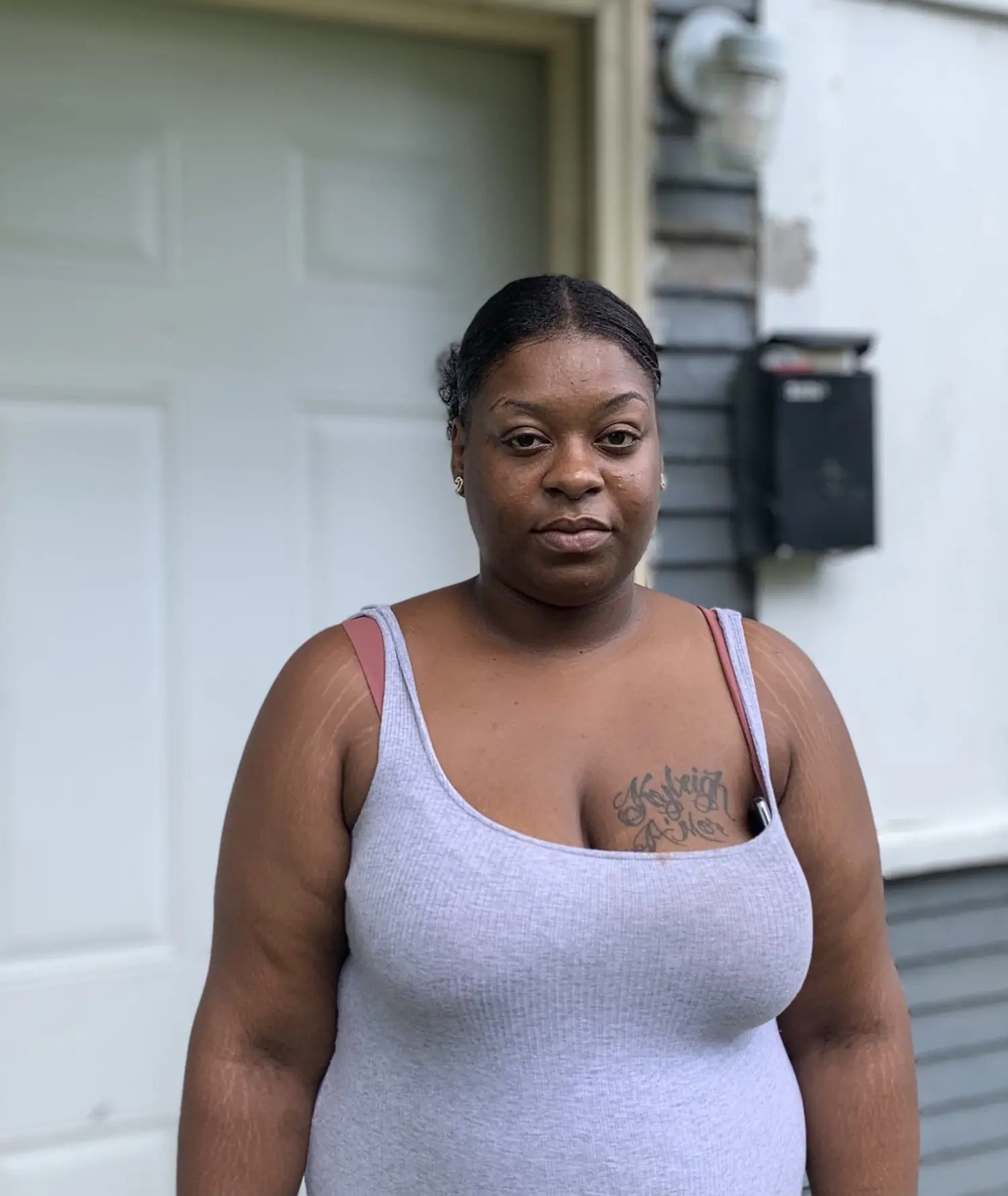
McKinney did not respond to messages left at her home by a Journal Sentinel reporter. Reached by phone later, McKinney was asked about the electrical violations at the rental unit and the fire. McKinney said she couldn’t talk but would be available to comment later. She has since failed to return repeated phone messages.
The other owner, Ward, is facing drug charges in Milwaukee and Waukesha counties. He and his attorney did not return repeated phone calls from the Journal Sentinel.
Zollicoffer said she couldn’t believe that McKinney was allowed to rent out the unit given her flouting of the city’s authority, to the point that a warrant was issued for her arrest.
“I feel like she should be in jail,” Zollicoffer said. “We were homeless and house-hopping, and now we are back to square one.”
The day after the April blaze, Zollicoffer recalled she was texting with McKinney about the fire and the many problems with the rental unit that were not fixed, including the lack of heat.
McKinney’s response: “You warm?”
Tenant describes suspected electrical problems to police the night his apartment caught fire
'It's beyond our scope'
When fire investigators don’t believe a fire was started intentionally or a crime was involved, they often don’t dig deeper.
“That isn’t really what we do,” said Andrew Timm, assistant chief with the Milwaukee Fire Department. “It’s beyond our scope.”
In fact, fire investigators with the state Department of Justice and the Milwaukee police and fire departments acknowledge that unless a crime is likely involved, they do not investigate most suspected electrical fires, labeling them “accidents” and listing their causes as “undetermined.”
More than 75% of suspected electrical fires in Milwaukee’s single- and two-family homes had the cause listed as undetermined or accidental, according to a Journal Sentinel analysis of fires from 2014-19.
“If we find an electrical issue — if it’s degraded wiring or loose connections or conductors — we may stop short,” said Brian Liethen, a special agent with the state Arson Bureau. “Because if it’s not a crime, we can allow others to come up with the exact cause.”
Nationwide, regulators have long known that failure to nail down the precise cause of a fire allows those responsible to escape accountability and perpetuates the problem. A 2014 report by the National Association of State Fire Marshals found that the lack of thorough investigations and determination of the causes of fires were nationwide concerns. The report noted: “What gets measured, gets fixed.”
Electrical fires usually start in a handful of ways. Damaged wiring insulation, resulting in exposed and touching wires, can cause electricity to jump or “arc,” generating heat or sparks. Broken light switches, loose outlets and service panels installed by unqualified contractors are also common causes of electrical fires.
To view the interactive on how these fires can spark, click here.
Landlords often blame tenants for dangerous extension cord use, but city regulators say the responsibility falls on landlords to make sure there are enough outlets and that they are working, reducing the need for extension cords.
While police and fire officials don’t usually drill down into the causes of electrical fires, insurance companies, which have a vested interest, often do.
But when landlords pay cash for buildings rather than take out loans — as is common in distressed areas of Milwaukee — they’re not required to have insurance.
Insurance companies are not subject to public open records laws, and so it’s difficult to know how many rental properties are not insured.
In a random sample of 25 rental properties in the 53206 ZIP code, however, the Journal Sentinel found 75% had no mortgage loans on file with the Milwaukee County Register of Deeds — meaning they likely didn’t have a mortgage and thus were not required to have insurance.
In the case where Colston and Murrell died, landlord Sherard told police he had no insurance, according to the police report.
No insurance, no further investigation. And no accountability.
“Wow,” said city Ald. Khalif Rainey, whose district includes a portion of 53206 and surrounding ZIP codes, when the Journal Sentinel told him the findings of its investigation. “You mean to tell me they’re renting uninsured homes to renters?”
Rainey said he wasn’t aware electrical fires were such a problem. That’s not surprising considering data collection about electrical fires at the local, regional and national level is scant and based on voluntary participation. The U.S. Fire Administration does not require the nation’s 30,000 fire departments to report fires, even when they result in death.
And often when the fires are reported — about three-quarters of the fire departments do submit at least partial data — key details are frequently missing, including information about the cause and whether there were any fatalities.
Of the Wisconsin residential structure fires reported into the National Fire Incident Reporting System from 2014-19, 60% listed nothing in the box for “factors contributing to ignition,” the Journal Sentinel analysis showed.
Based on the limited entries that did include factors that started the fires, the national database indicates there are an average of 30 suspected electrical fires across the city of Milwaukee every year, five of which occur in the 53206 ZIP code.
The database also showed that between 2009 and 2019 there were at least 3,077 suspected electrical fires in Wisconsin homes — an average of about 280 every year and a 40% increase during the 11-year period.
To find what government data failed to record, the Journal Sentinel pieced together information on residential electrical fires in Wisconsin through open records requests with local fire departments, medical examiners offices, city departments of neighborhood services and state fire marshals as well as the national database maintained by the U.S. Fire Administration.
The national database lists 229 fire-related deaths statewide from 2009-19, with eight deaths in Milwaukee.
In reality, Milwaukee had at least 68 fire-related deaths, the Journal Sentinel found.
Safeguards stripped away
As other cities and states enact protections for tenants, Milwaukee and Wisconsin are headed in the other direction. What few safeguards the city and state did have were rolled back in a series of landlord-friendly bills passed by the state Legislature and Milwaukee Common Council in the past decade.
The front line in protection for renters is the Milwaukee Department of Neighborhood Services. Yet the department doesn’t routinely inspect single- and two-family rental units, leaving tenants on their own to determine if they are safe.
The city also softened its permitting requirements for some electrical work, such as replacing outlets and switches. In a council meeting in 2013, Tom Mishefske, operations director for the Neighborhood Services department, said some electrical work didn’t need the city’s oversight and that the change was a “minor lightening of the requirements.” He equated changing an electrical switch or outlet to replacing a faucet on a kitchen sink.
In a recent interview with the Journal Sentinel, Mishefske said the change in the permitting requirement was the result of pressure from some members of the Common Council and property owners.
“We got a lot of heat from rehabbers and others, including aldermen,” he said.
Pulling a permit triggers an inspection by the city’s electrical experts who can verify whether the work was done properly.
In the house where Colston and Murrell died, inspectors ordered a permit be pulled for electrical repairs in 2017, two years before the fire. The Journal Sentinel could find no permit on file.
Danell Cross, a longtime resident of neighborhoods next to the 53206 ZIP code who herself escaped a blaze in a unit she was renting, said the problem begins with a lack of accountability.
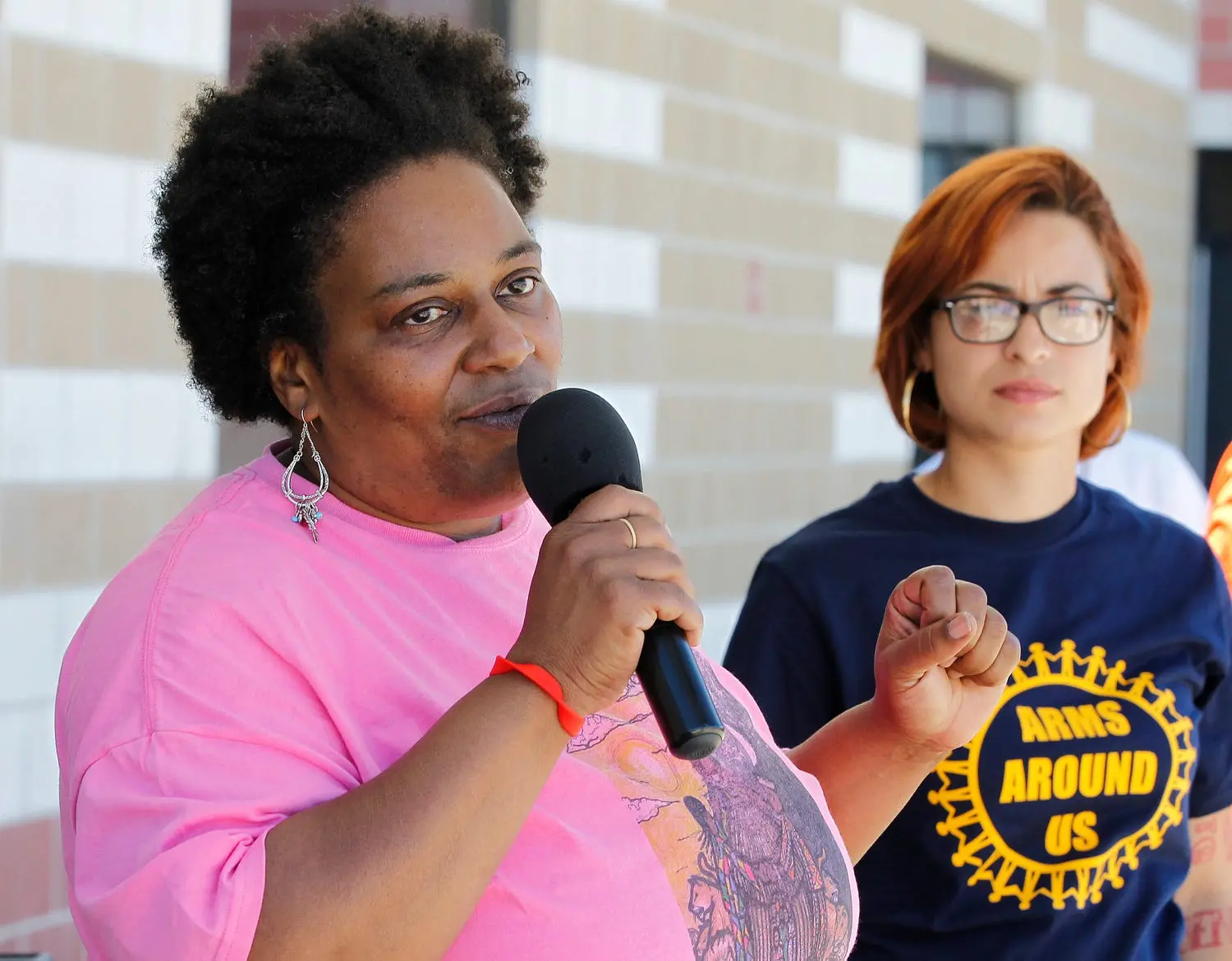
“People are dying, and they are not telling us who is responsible for that loss of life,” said Cross, now director of Metcalfe Park Community Bridges, a nonprofit neighborhood improvement group. “And that is something that needs to change.”
Regarding the duplex where Carter, Zollicoffer and her two young daughters narrowly escaped, Cross said: "If this was a young white family in a white neighborhood, they would not have even been allowed in that house with those code violations."
State lawmakers outlawed the city's residential rental inspection program five years ago at the prompting of the Wisconsin Realtors Association and the Apartment Association of Southeastern Wisconsin. Both groups had lobbied the Legislature to pass a law banning such programs.
The inspection program required rental units in certain neighborhoods with many negligent landlords to be certified by building inspectors.
The Realtors and apartment associations argued such programs were costly and unfair.
Representatives of at least two neighborhood associations wrote to city and state officials expressing support for Milwaukee’s program and their concern that lawmakers sponsoring the changes had conflicts of interest, emails obtained by the Journal Sentinel show.
“Inexplicably, this bill will reward the bad apples,” wrote Bill Werner, president of the Mariners Neighborhood Association, in a 2015 email to city and state lawmakers. “It is troubling that of the five sponsors/co-sponsor of the bill, three are listed in the Blue Book as Realtors and one is a former broker.”
At least one study showed Milwaukee’s residential rental inspection program worked.
A 2014 analysis by the city’s Department of Neighborhood Services found the number of violations spiked in the previous five years and then declined over time, indicating problems were being addressed, according to the authors. And, the analysis found, complaints from renters to city aldermen about the condition of their apartments and the responsiveness of landlords dropped substantially.
The program allowed inspectors access to properties in vulnerable areas and routinely exposed violations for such things as defective electrical switches, improper wiring and missing fire safety alarms, the authors wrote. They also said the program encouraged landlords to take a more proactive approach to maintenance.
The program was so successful they recommended expanding it into other neighborhoods.
Since the routine inspections ended, the number of properties being cited for violations in the neighborhoods that the program targeted has dropped nearly 80%, a Journal Sentinel analysis showed. City officials say that's most likely because tenants are afraid to call and complain and, as a result, inspectors aren't getting to the properties.
In another change in 2016, then-Gov. Scott Walker signed into law a provision that said properties did not need to be inspected and brought up to code at the time of sale. In Milwaukee, that nixed an exterior inspection of all properties changing hands.
Wisconsin law changed again in 2018 and now allows rental inspection programs but caps the fees that cities can charge landlords to do inspections. City officials say the change makes it cost-prohibitive and therefore they are not doing them.
“It is the responsibility of the landlord to maintain their property and provide a safe unit for the tenant,” said Mishefske, the neighborhood services official. “If we get a complaint, we’ll investigate.”
That kind of complaint-based system is deeply flawed, according to tenant advocacy groups.
Tenants often don’t have the expertise, and they worry they may be evicted for complaining, said Gregory Miao, an attorney with ChangeLab Solutions, a national health equity and housing improvement group based in Oakland, California. He said at least 15 of the nation’s largest cities, including Baltimore, Minneapolis and Boston, have various types of residential rental inspection programs.
“It saves lives,” Miao said.
Violations preceded fatal fire
In October 2019, Patricia Colston was already renting from Will Sherard — known in Milwaukee for his poor upkeep of dozens of properties — before she moved to the North 14th Street duplex where she died.
Sherard, who was jailed for several days in 2011 by a federal judge for failing to follow court orders and clean up lead paint in his units, was also threatened with jail in 2018 for failing to pay more than $60,000 in fines for code violations. Faced with being locked up again, Sherard paid a portion of the fines and set up a monthly payment schedule.
Sherard had sold the place where Colston had been living. He offered her the option to move to another of his rentals on North 14th Street, just off West Capitol Drive. Family members told the Journal Sentinel Sherard didn’t mention any problems with the electricity in the house. But records show the property had been repeatedly cited for “potentially hazardous” electrical wiring that was “improperly installed or defective.”
The place was also a mess, the family members said; somebody else’s belongings were still scattered throughout when Colston moved in.
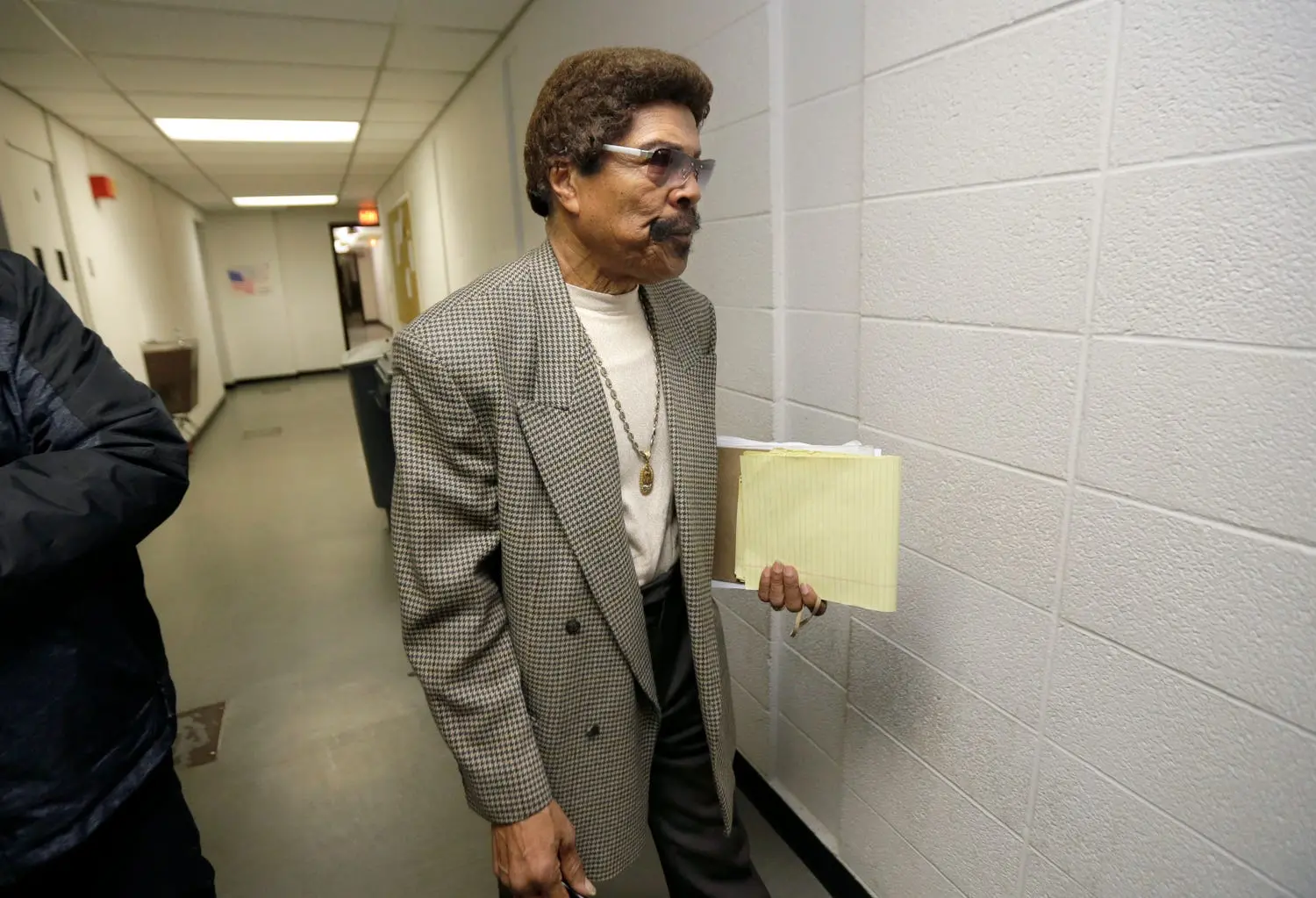
Her friend, Clarence Murrell, offered to help her clean on the evening of Oct. 11.
Before sunrise, a downstairs neighbor smelled smoke and called 911.
“It smells like it’s burning,” the woman told the dispatcher. “It smells like something electrical is set on fire and it’s burning.”
Firefighters arrived at 6:17 a.m. They saw no smoke outside, the reports say. They inspected the basement and entire first floor with a thermal imaging camera. When they moved up to the second floor they still found no heat.
But when they opened the door to Colston’s apartment, heavy smoke poured out. They could see fire burning in a living room wall. It took them less than 25 seconds to put it out.
When firefighters moved to the back of the house, they found Colston and Murrell on the kitchen floor, 10 feet apart near the back door. They were covered in soot and unresponsive and were pronounced dead soon after.
The autopsies list their cause of death as “smoke and soot inhalation.”
Murrell’s family last year filed a wrongful death lawsuit against Sherard and his company, Morocco Investments, alleging the landlord failed to maintain the electrical system in the duplex where Murrell and Colston died. The family's attorney, Justin Padway, said he is taking depositions and that no trial date has been set.

Angel Sodamade, Murrell’s daughter and a plaintiff in the case, said her father deserved to be safe.
"I lost a father, and my son lost his grandfather,” she said. “We want justice and to ensure that no other family is harmed at the hands of Sherard and other reckless landlords."
Sherard's attorney in the case, Robert Meyeroff, declined to be interviewed.
Sherard bought the house where Colston and Murrell died from a sheriff’s sale for $12,100 in 2014, records show. Following complaints three years later, the city cited the property for 28 code violations, including several pertaining to electrical problems. It’s unclear whether the electrical problems were properly fixed as the Journal Sentinel could find no permit on file — despite the city’s orders that a permit be pulled.
“You don’t just buy some property and slap some paint on the wall and throw somebody in it,” said Tiffany McCarver, Colston’s daughter. “(Sherard) should have had it up to date, and it should have been checked out. … When you pay rent somewhere, you pay to feel safe, not to worry about if your house is going to catch on fire.”
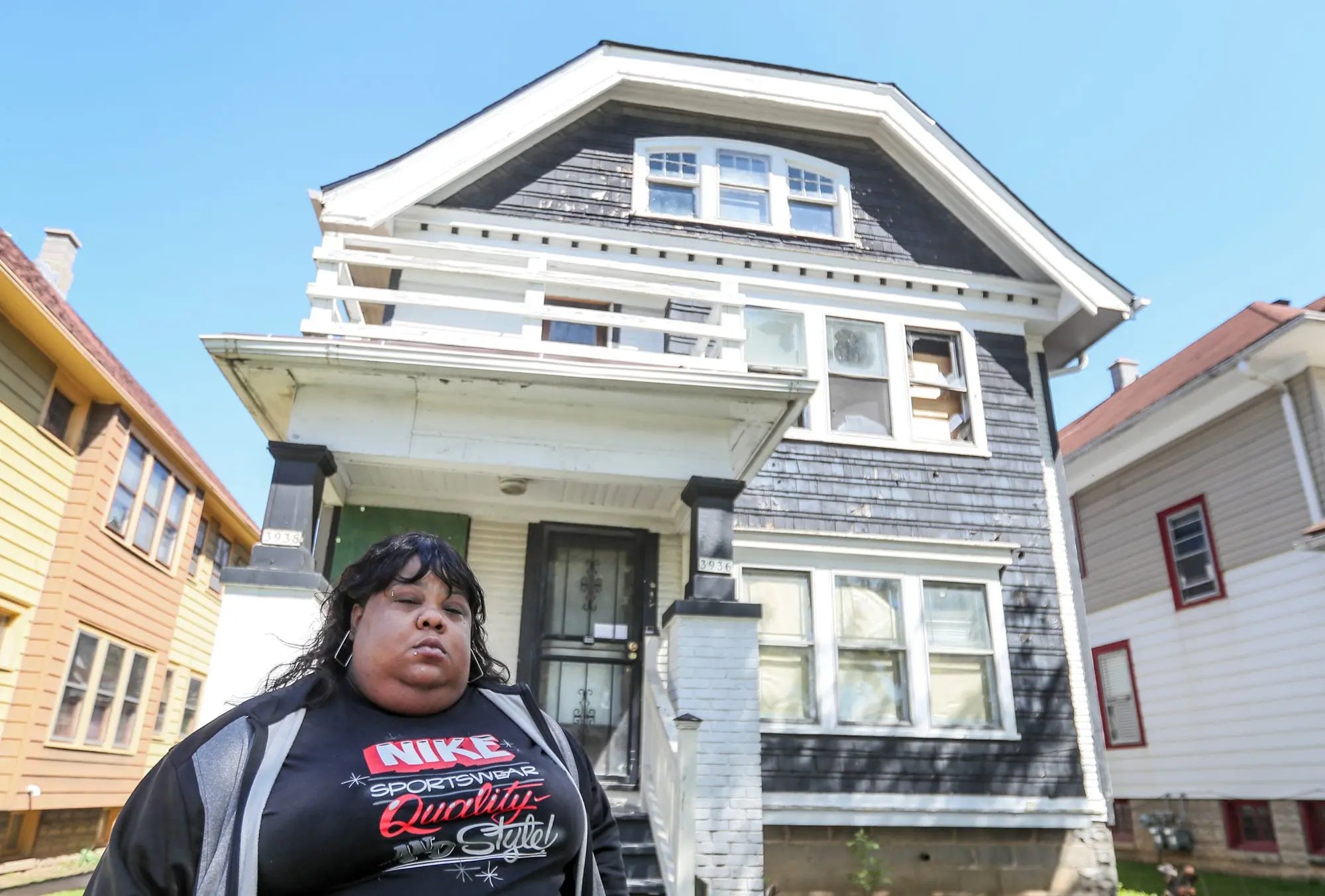
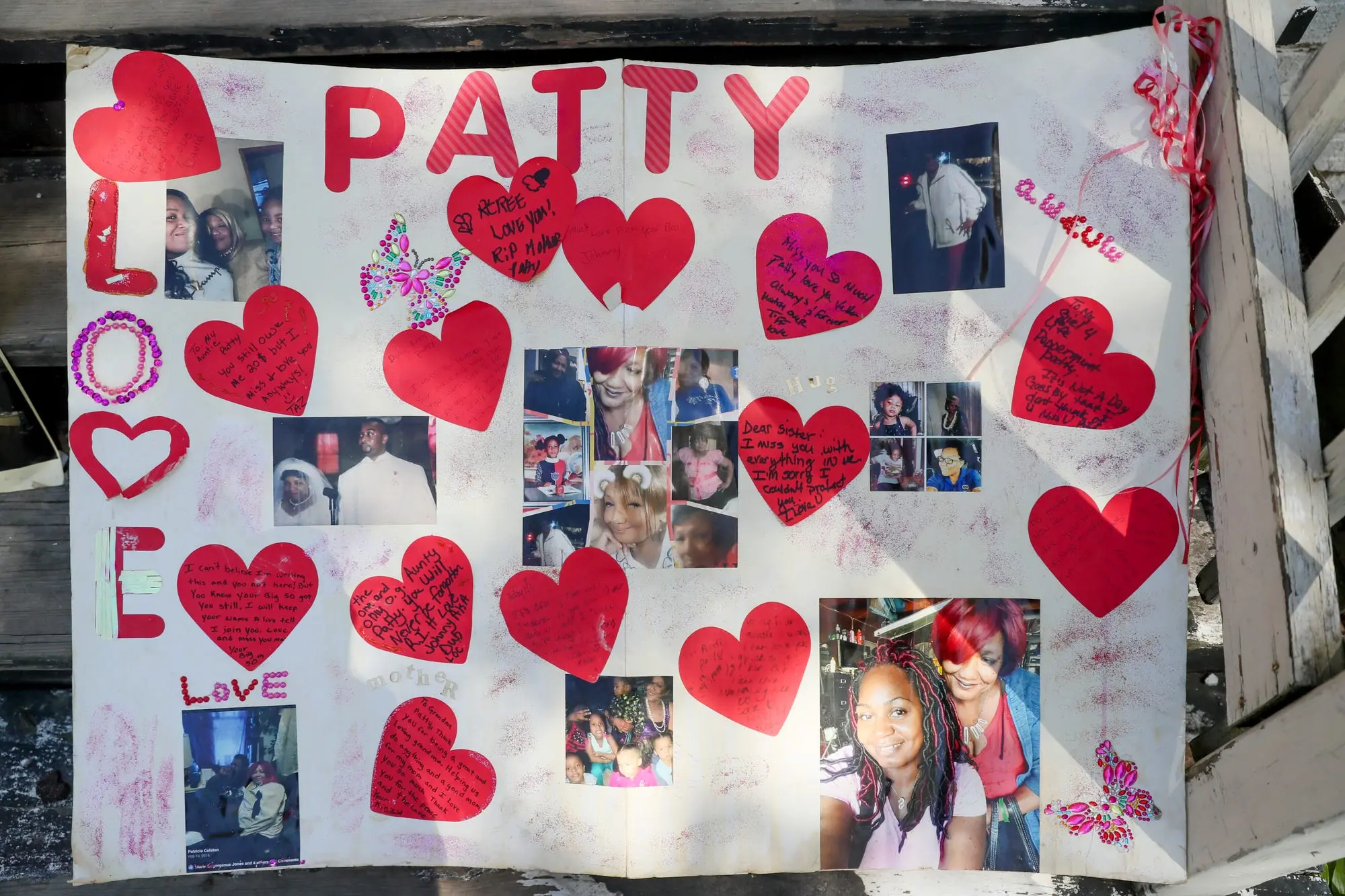
Sherard sold the house several weeks after the fire for $20,000. The new owner took out a permit in March to upgrade the electrical service to the building, according to city records.
McCarver, a 35-year-old from Milwaukee, said she could not salvage any of her mother’s belongings after the fire because they were all destroyed, covered in black soot.
And, she said, the landlord refused to return the rent or her mother’s security deposit.
“He said he wouldn’t because her stuff was still in the house,” McCarver said.













